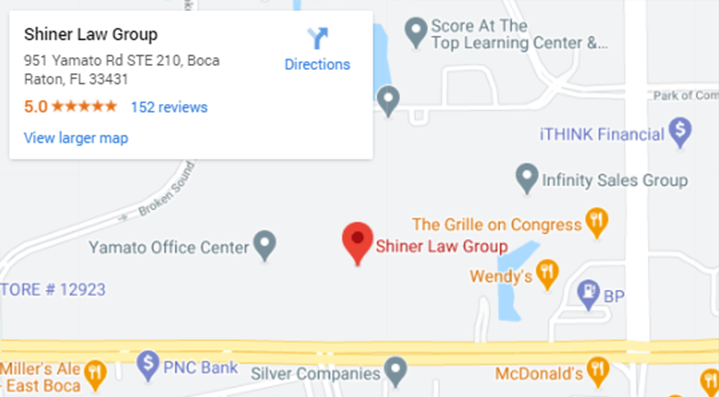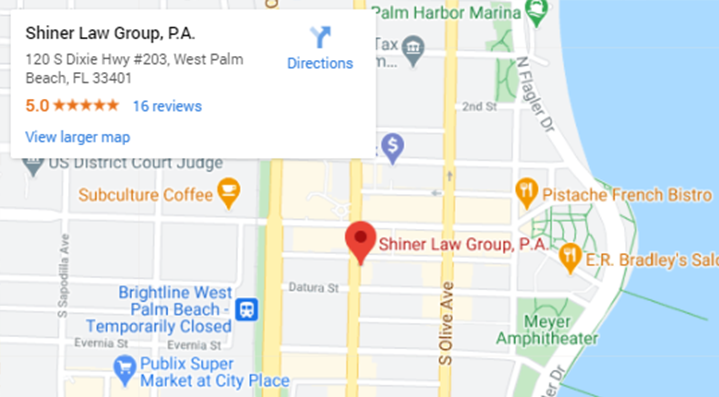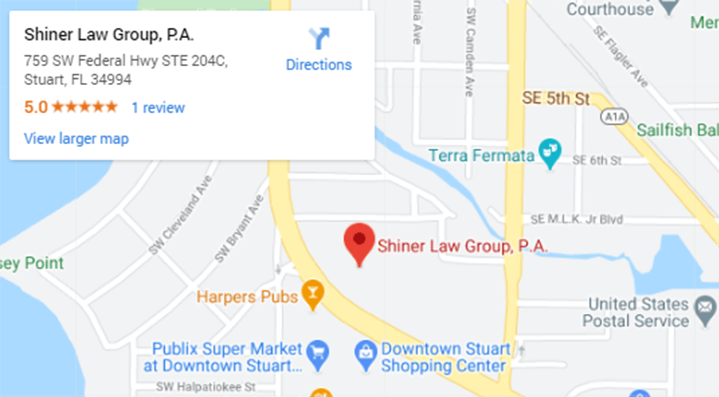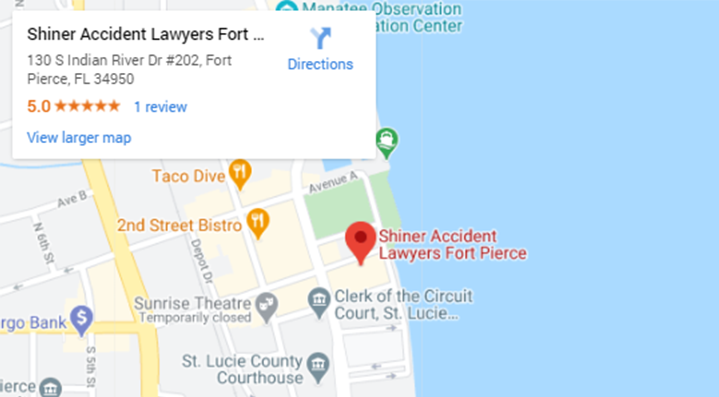Florida False And Deceptive Advertising
When retailers or manufacturers spread misinformation, use misleading tactics, and make false claims to boost sales, they are getting involved in one or multiple deceptive trade practices. One instance of this is the tampering of odometers by car dealers, and making inaccurate claims about a product. Florida’s deceptive trade practices law follows the Uniform Deceptive Trade Practices Act, which allows consumers and the enforcing authority of any industry to file false and deceptive advertising lawsuits.
State and federal law prohibits companies from using any false or deceptive advertising practices, and those convicted of using unlawful practices will be required to pay damages of up to $10,000 in penalties for each violation, in addition to attorney’s fees, and actual damages. Therefore, if you have been accused of using false or deceptive advertising practices, it is imperative that you speak with the experienced Florida false and deceptive advertising attorneys at Shiner Law Group today!
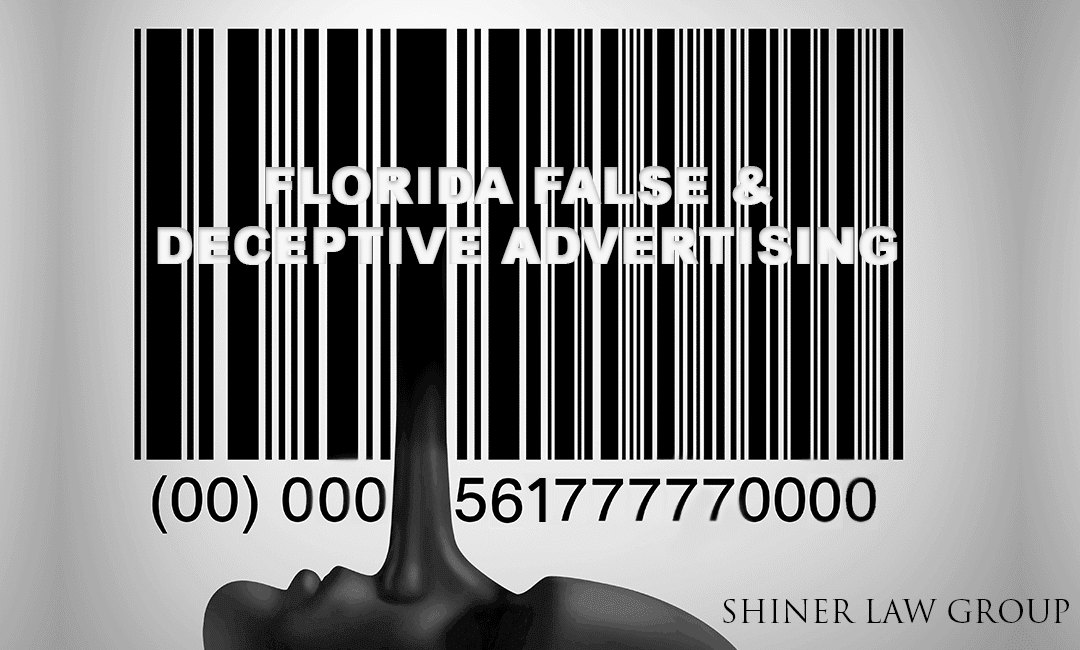
What Is Deceptive Advertising?
False or deceptive advertising is related to any type of advertising that is misleading, false, or has effectively deceived consumers. An advertisement may be deceptive in several aspects, including:
- Price of a product
- Quantity of a product
- The quality or standard of the item
- Locations and dates of product availability
- Information regarding warranties
- False facts regarding deals or sales
- Confusion over interest rates or other factors
Under State and Federal law, advertising can be considered deceptive, even if the creator didn’t intend for it to be so. This means that if the deceptive advertising claim was a mistake, the creator can still be convicted for false or deceptive advertising.
What Qualifies as Intentional False Advertising?
Florida law, strictly prohibits the intentional use of false advertising for the sale of products, personal property, or any services. This law also extends to the placement of an advertisement before public that describes services or product, with no intent from the ad creator to sell the products at the mentioned price. Businesses are also prohibited from making false claims about the quality or purpose of a product, or to give consumers an inaccurate understanding of the products they are buying.
There are numerous forms of false or deceptive advertising tactics used to sell products and services, which includes the following:
Bait and Switch Advertising
When businesses promise to sell items or services at discounted prices to attract consumers but end up selling them costlier products.
High-Pressure Sales Tactics
This involves putting pressure on a consumer to purchase a product or service they didn’t intend to or want to buy.
Artificially Inflating Prices
When businesses create the illusion that they are offering consumers a great deal on a product or service but refuse to sell the product at the price that was advertised.
In general, refusing to sell a product or service at the advertised price creates a rebuttable presumption that the seller intended to use false or deceptive advertising practices.
Exceptions to False and Deceptive Advertising
There are some exceptions when the laws governing false and deceptive advertising don’t apply to specific entities and individuals, which include the following:
- Magazines, newspapers, or publication publishers
- Advertising media, television stations, and operators or owners of radio stations
If these entities place an advertisement to the public in good faith, with no knowledge that the person advertising doesn’t intend to sell the product or service to the public, then they can escape liability, under the law prohibiting false and deceptive advertising.
Are There Any Legal Penalties for Deceptive Advertising?
Any company, individual, or other entity, that has been accused of using false or deceptive advertising practices will incur legal penalties, and they will be forced to do the following:
- Civil fines
- Include disclosure statements in their advertising
- Injunction to have the ad replacement or removed
- Legal damages for losses caused to a consumer
- Pay monetary damages to consumers
- Pay the cost of reasonable attorney’s fees for the other parties.
- Pay up to $10,000 in fines for each violation
- Public recall of a product (in cases where the product has a defect)
- Refund or exchange of a product
- Stop engaging in deceptive practices
- Stop running certain advertisements
The Federal Trade Commission (FTC), handles and investigates most of the claims of false and deceptive advertising. There are special laws for certain types of products or services rendered. For example, there are specific laws governing the advertising of professionals like lawyers and doctors.
Restrictions on deceptive consumer practices have been highlighted in Chapter 501 of the Florida statutes, also known as the Florida Deceptive and Unfair Trade Practices Act. This law regulates the behavior of an extensive range of industries, which includes credit cards, consumer products (like cars), real estate, and food and supplements. Banned behavior is industry specific, but retailers and manufacturers can’t use deceptive labeling or false advertising, or tamper with any product being sold.
What’s more, Florida Statutes allow an aggrieved person to seek declaratory relief and injunctive relief and also recover actual damages and attorney’s fees and costs associated with bringing the claim of deceptive actions (see Florida Statute Section 501.211). However, consumers who bring claims under FDUTPA must be aware that if their claim is found to be frivolous by a judge, then the court can award attorneys’ fees and costs against the party instituting the legal action.
Who Can File a False and Deceptive Advertising Lawsuit?
A private citizen, who was the victim of deceptive or false practices, and the government authority in charge of enforcing the conduct of a specific industry may file a false and deceptive advertising lawsuit against a manufacturer or seller.
When filing a claim for deceptive trade practices or false advertising, you must keep all documents related to the claim, which may include a copy of the ad in question, purchase orders, and receipts. You should also make a written account of how the false advertisement affected your judgement and include an estimate of the losses or damages you suffered. These can serve as evidence in any upcoming trial and is also useful for the attorney reviewing your case.
What Compensation for Damages Can You Expect?
Compensation for damages suffered by parties may vary, based on the exact conduct alleged. The potential compensation for damages from a false and deceptive advertising case can include:
- Actual damages if the defendant acted in bad faith
- An Injunction (a court order instructing the defendant to perform an action or stop certain behavior)
- Declaratory judgment (a court determination of the duties or rights of parties involved in a civil dispute).
Apart from that, willful unfair or deceptive trade practices in any industry can result in a civil fine of $10,000 and all reasonable attorney fees and costs paid to the party filing the lawsuit.
Get Legal Representation for Deceptive Trade Practices in Florida
It can be quite complicated and challenging to prove a false and deceptive advertising case under the Florida Deceptive and Unfair Trade Practices Act (FDUTPA). The false and deceptive advertising attorneys at Shiner Law Group have years of actual experience in helping consumers in Florida, who are victims of deceptive trade practices.
If you believe that you are also a victim of fraud, deceptive action, or deceit in a business or commercial transaction, then contact the business lawyers of Shiner Law Group immediately, by calling at (561) 777-7700, to speak with one of our deceptive trade practice attorneys for a FREE case consultation regarding your case.

